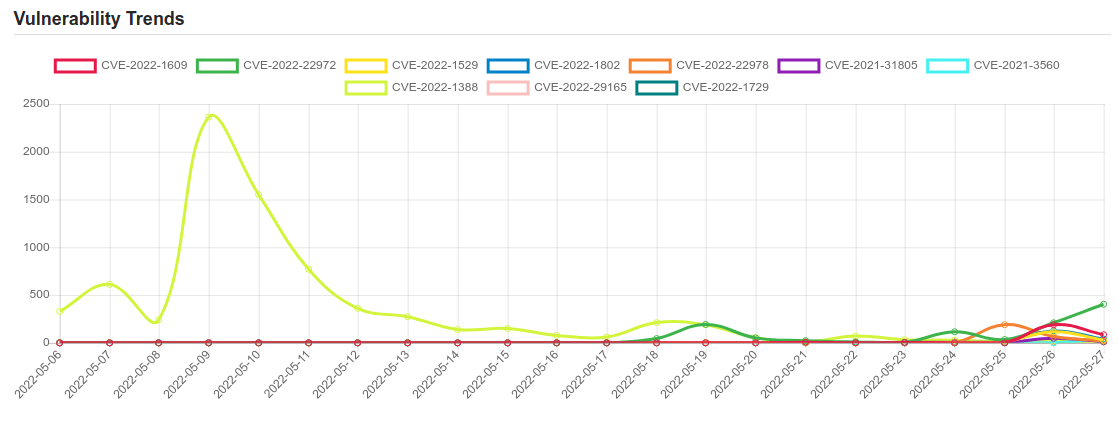Daily Vulnerability Trends: Sat May 28 2022

| CVE NAME | CVE Description |
| CVE-2022-22784 | The Zoom Client for Meetings (for Android, iOS, Linux, MacOS, and Windows) before version 5.10.0 failed to properly parse XML stanzas in XMPP messages. This can allow a malicious user to break out of the current XMPP message context and create a new message context to have the receiving users client perform a variety of actions.This issue could be used in a more sophisticated attack to forge XMPP messages from the server. |
| CVE-2022-22787 | The Zoom Client for Meetings (for Android, iOS, Linux, macOS, and Windows) before version 5.10.0 fails to properly validate the hostname during a server switch request. This issue could be used in a more sophisticated attack to trick an unsuspecting users client to connect to a malicious server when attempting to use Zoom services. |
| CVE-2022-25237 | No description provided |
| CVE-2022-30781 | Gitea before 1.16.7 does not escape git fetch remote. |
| CVE-2022-24706 | In Apache CouchDB prior to 3.2.2, an attacker can access an improperly secured default installation without authenticating and gain admin privileges. The CouchDB documentation has always made recommendations for properly securing an installation, including recommending using a firewall in front of all CouchDB installations. |
| CVE-2022-23270 | Point-to-Point Tunneling Protocol Remote Code Execution Vulnerability. This CVE ID is unique from CVE-2022-21972. |
| CVE-2022-29248 | Guzzle is a PHP HTTP client. Guzzle prior to versions 6.5.6 and 7.4.3 contains a vulnerability with the cookie middleware. The vulnerability is that it is not checked if the cookie domain equals the domain of the server which sets the cookie via the Set-Cookie header, allowing a malicious server to set cookies for unrelated domains. The cookie middleware is disabled by default, so most library consumers will not be affected by this issue. Only those who manually add the cookie middleware to the handler stack or construct the client with [‘cookies’ => true] are affected. Moreover, those who do not use the same Guzzle client to call multiple domains and have disabled redirect forwarding are not affected by this vulnerability. Guzzle versions 6.5.6 and 7.4.3 contain a patch for this issue. As a workaround, turn off the cookie middleware. |
| CVE-2022-22785 | The Zoom Client for Meetings (for Android, iOS, Linux, MacOS, and Windows) before version 5.10.0 failed to properly constrain client session cookies to Zoom domains. This issue could be used in a more sophisticated attack to send an unsuspecting users Zoom-scoped session cookies to a non-Zoom domain. This could potentially allow for spoofing of a Zoom user. |
| CVE-2022-1609 | No description provided |
| CVE-2022-22972 | VMware Workspace ONE Access, Identity Manager and vRealize Automation contain an authentication bypass vulnerability affecting local domain users. A malicious actor with network access to the UI may be able to obtain administrative access without the need to authenticate. |
| CVE-2022-1529 | No description provided |
| CVE-2022-1802 | No description provided |
| CVE-2022-22978 | In Spring Security versions 5.5.6 and 5.5.7 and older unsupported versions, RegexRequestMatcher can easily be misconfigured to be bypassed on some servlet containers. Applications using RegexRequestMatcher with `.` in the regular expression are possibly vulnerable to an authorization bypass. |
| CVE-2021-31805 | The fix issued for CVE-2020-17530 was incomplete. So from Apache Struts 2.0.0 to 2.5.29, still some of the tag’s attributes could perform a double evaluation if a developer applied forced OGNL evaluation by using the %{…} syntax. Using forced OGNL evaluation on untrusted user input can lead to a Remote Code Execution and security degradation. |
| CVE-2021-3560 | It was found that polkit could be tricked into bypassing the credential checks for D-Bus requests, elevating the privileges of the requestor to the root user. This flaw could be used by an unprivileged local attacker to, for example, create a new local administrator. The highest threat from this vulnerability is to data confidentiality and integrity as well as system availability. |
| CVE-2022-1388 | On F5 BIG-IP 16.1.x versions prior to 16.1.2.2, 15.1.x versions prior to 15.1.5.1, 14.1.x versions prior to 14.1.4.6, 13.1.x versions prior to 13.1.5, and all 12.1.x and 11.6.x versions, undisclosed requests may bypass iControl REST authentication. Note: Software versions which have reached End of Technical Support (EoTS) are not evaluated |
| CVE-2022-29165 | Argo CD is a declarative, GitOps continuous delivery tool for Kubernetes. A critical vulnerability has been discovered in Argo CD starting with version 1.4.0 and prior to versions 2.1.15, 2.2.9, and 2.3.4 which would allow unauthenticated users to impersonate as any Argo CD user or role, including the `admin` user, by sending a specifically crafted JSON Web Token (JWT) along with the request. In order for this vulnerability to be exploited, anonymous access to the Argo CD instance must have been enabled. In a default Argo CD installation, anonymous access is disabled. The vulnerability can be exploited to impersonate as any user or role, including the built-in `admin` account regardless of whether it is enabled or disabled. Also, the attacker does not need an account on the Argo CD instance in order to exploit this. If anonymous access to the instance is enabled, an attacker can escalate their privileges, effectively allowing them to gain the same privileges on the cluster as the Argo CD instance, which is cluster admin in a default installation. This will allow the attacker to create, manipulate and delete any resource on the cluster. They may also exfiltrate data by deploying malicious workloads with elevated privileges, thus bypassing any redaction of sensitive data otherwise enforced by the Argo CD API. A patch for this vulnerability has been released in Argo CD versions 2.3.4, 2.2.9, and 2.1.15. As a workaround, one may disable anonymous access, but upgrading to a patched version is preferable. |
| CVE-2022-1729 | No description provided |
| CVE-2022-23648 | containerd is a container runtime available as a daemon for Linux and Windows. A bug was found in containerd prior to versions 1.6.1, 1.5.10, and 1.14.12 where containers launched through containerd’s CRI implementation on Linux with a specially-crafted image configuration could gain access to read-only copies of arbitrary files and directories on the host. This may bypass any policy-based enforcement on container setup (including a Kubernetes Pod Security Policy) and expose potentially sensitive information. Kubernetes and crictl can both be configured to use containerd’s CRI implementation. This bug has been fixed in containerd 1.6.1, 1.5.10, and 1.4.12. Users should update to these versions to resolve the issue. |
| CVE-2022-26937 | Windows Network File System Remote Code Execution Vulnerability. |
If you like the site, please consider joining the telegram channel and supporting us on Patreon using the button below.



![CACTUS Ransomware Victim: https://www[.]ghimli[.]com / 6 image](https://www.redpacketsecurity.com/wp-content/uploads/2023/09/image-300x291.png)


